Hosting seasonal gatherings or handling expansions at a golf or country club shouldn’t overwhelm your kitchen or leave members waiting in long lines. Yet delivering restaurant-quality dining at scale is a persistent challenge, from outfitting halfway houses and beverage carts to keeping clubhouse service running smoothly, all without the burden of costly, disruptive renovations.
That’s why many clubs are turning to shipping-container kitchens: modular, high-performance units that deploy quickly, control costs, and meet the same standards as a permanent commercial kitchen. They provide the flexibility of a mobile solution with the reliability of a fixed build, making them ideal for peak-season demand and special events.
Food and beverage is a cornerstone of club profitability, contributing 21.3% of profits in the $26.2 billion U.S. golf and country club industry. Yet clubs collectively lose more than US $5.65 billion in F&B revenue each year, driven by missed service opportunities, self-supplied items, and waste. This highlights both the importance of F&B operations and the cost of inefficiencies — gaps that container kitchens are uniquely positioned to close.
In this article, we’ll examine why container kitchens are gaining traction in hospitality, the specific advantages they bring to golf and country clubs, and how ContekPro delivers premium prefab solutions tailored to high-end properties.
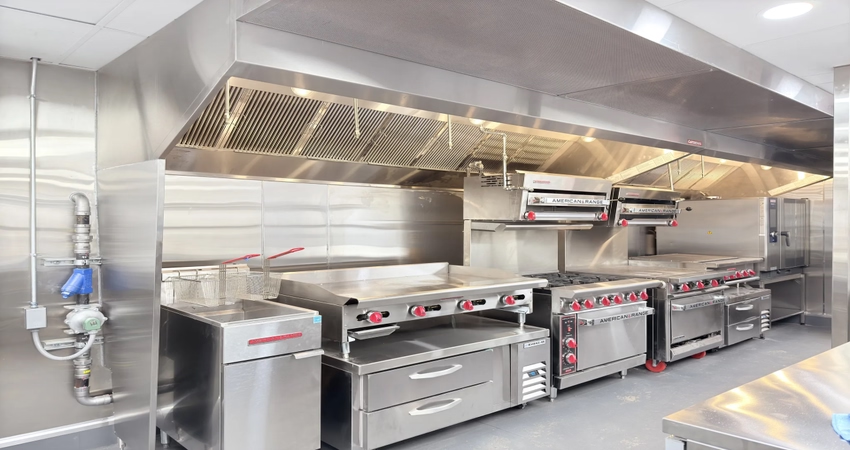
A shipping container kitchen is a repurposed or newly fabricated steel container converted into a fully functional commercial kitchen. Unlike temporary food trailers, these are permanent-grade facilities designed to meet the same building, health, and fire safety codes as traditional kitchens. Built for durability and mobility, they combine the resilience of shipping containers with the full infrastructure of a professional foodservice operation.
Container kitchens are engineered with the same specifications as brick-and-mortar builds, but with the flexibility of modular construction. They can be tailored to a wide range of footprints: from compact 160 sq ft units ideal for concessions or beverage stations to expansive multi-container builds of 6,400 sq ft or more capable of serving large banquets and events.
Typical features include:
Depending on need, a container kitchen can be tailored into different configurations:
This flexibility allows golf and country clubs to scale foodservice capacity based on seasonal demand while maintaining the high dining standards expected by members. Whether supporting a major tournament or serving casual outdoor dining, a shipping container kitchen can be customized to fit the club’s exact needs.
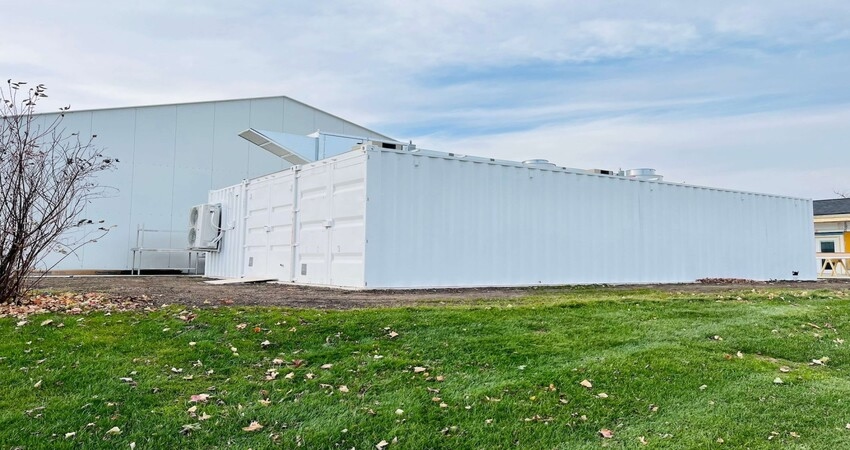
The financial advantage of a shipping container kitchen is one of its strongest appeals. While traditional commercial kitchens can cost $250–$400 per square foot, container kitchens typically range from $150,000 to $800,000 depending on size and equipment package, representing up to 30% in capital savings. Prefabricated in controlled environments, they offer fixed pricing with fewer unexpected costs, reducing risk for clubs. Smaller footprints also mean lower energy bills and operational costs, allowing earlier revenue generation compared to lengthy traditional builds. For golf clubs balancing high expectations with tight budgets, this efficiency is critical.
Time to market is another decisive advantage. A conventional kitchen expansion may take 6–12 months, while a prefabricated shipping container kitchen can be delivered, installed, and operational in 8–12 weeks. The Modular Building Institute reports modular construction can cut project timelines by up to 50%, allowing clubs to launch faster and minimize downtime. For seasonal venues, faster deployment ensures kitchens are ready for tournaments, weddings, and high-volume summer events when demand peaks.
Shipping container kitchens arrive as turnkey units, fully outfitted and code-compliant. Clubs don’t need to coordinate multiple contractors or manage complex construction logistics since installation is as straightforward as placing the unit and connecting utilities. This simplicity reduces administrative burden for managers, allowing them to focus on member experience rather than project management.
In an industry increasingly focused on responsible development, container kitchens align with sustainability goals. Repurposing ISO containers reduces embodied carbon, while off-site fabrication minimizes construction waste. The U.S. Environmental Protection Agency (EPA) identifies material reuse as one of the most effective ways to reduce the environmental impact of construction and demolition. Enhanced insulation, energy-efficient equipment, and smaller operating footprints further reduce daily utility consumption. This makes container kitchens not only cost-efficient, but also environmentally responsible.
Unlike traditional renovations that involve months of noisy, messy construction, shipping container kitchens are plug-and-play solutions. Once set on a flat surface and connected to utilities, the kitchen is ready to operate. This means members can continue enjoying the club’s amenities without interruption — a critical factor for maintaining the exclusive atmosphere golf clubs are known for.
Perhaps the most unique advantage is mobility. A shipping container kitchen can be relocated, resold, or leased, preserving long-term investment. For golf clubs, this means:
This agility ensures clubs can adapt their foodservice strategy as member expectations evolve, without being locked into permanent, costly expansions.

Golf and country clubs face unique operational challenges: seasonal swings in demand, the need to host high-profile events, and the pressure to deliver uninterrupted dining experiences even during renovations. Shipping container kitchens provide a flexible, premium solution across a variety of scenarios.
As membership grows, demand on dining programs intensifies. A prefabricated container kitchen allows clubs to expand capacity without the disruption or expense of permanent construction. These units can serve as auxiliary kitchens dedicated to banquets, pastry production, or cold prep—freeing up the main kitchen to handle daily dining. The result is shorter wait times, faster service, and an elevated member experience.
Note: ContekPro delivered a 960-sq-ft shipping container kitchen in just four months, aligned with a private club’s project schedule. Outfitted with premium equipment, dedicated walk-in refrigeration, freezer and dishwashing zones, plus custom storage, the unit streamlined operations while supporting long-term growth.
Golf and country clubs host large-scale gatherings such as weddings, charity galas, and summer tournaments that can overwhelm existing facilities. A container kitchen positioned near the event site enables chefs to plate and serve meals without straining the main kitchen—ensuring food is delivered hot, fresh, and on time. Clubs can also use these units for pop-up concepts like BBQ pavilions, cocktail lounges, or smoothie bars, adding variety to the seasonal dining program.
Note: At a world-class private golf destination in Florida, ContekPro delivered a 1,280-sq-ft shipping container kitchen in just five weeks. Outfitted with Vulcan charbroilers, griddles, heavy-duty fryers, and Beverage-Air refrigeration, the unit supported high-volume dining for members and guests during tournaments, with the added benefit of being relocatable after its initial deployment.
Renovating a clubhouse kitchen often means months of disruption, which can frustrate members and erode revenue. A shipping container kitchen allows clubs to maintain uninterrupted service during renovations. With full cooking, prep, and dishwashing capacity, these units function as a seamless temporary replacement, keeping dining standards intact and members satisfied until renovations are complete.
Note: When one of Florida’s most prestigious private clubs launched a $74 million clubhouse transformation, ContekPro supplied a 1,280 sqft shipping container kitchen and a 640 sqft dishwashing and laundry unit to sustain operations throughout the three-year project. Durable, relocatable, and designed for Florida’s climate, the solution allowed members to enjoy uninterrupted five-star dining while the property redefined its future.
Not all events happen inside the clubhouse. Clubs often host receptions, tournaments, and parties at remote parts of the property, where foodservice logistics are challenging. A shipping container kitchen can be placed at the 18th hole, poolside, or near an outdoor pavilion, bringing professional-grade dining directly to the venue. This enhances flexibility and creates memorable experiences without compromising service quality.
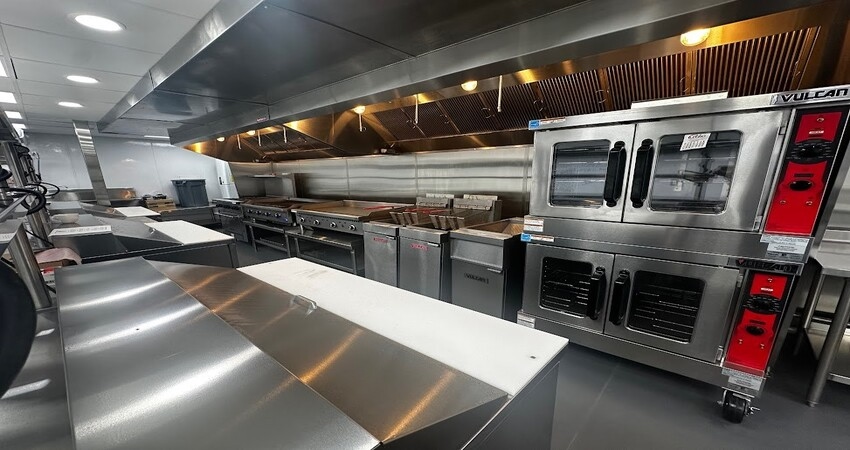
When investing in a commercial kitchen in a shipping container, golf and country clubs should evaluate several key factors to ensure the unit aligns with operational goals, member expectations, and regulatory requirements.
Shipping container kitchens are available in standard 20-foot (≈160 sq. ft.) and 40-foot (≈320 sq. ft.) footprints, but modular builds can be combined and customized into multi-container facilities ranging from 640 sq. ft. to over 6,400 sq. ft. This flexibility allows clubs to scale from compact concession-style units to full-scale banquet kitchens.
Like any commercial food facility, a shipping container restaurant kitchen must meet strict codes:
Partnering with an experienced modular manufacturer helps clubs navigate these requirements, ensuring the kitchen is fully code-compliant on day one.
A container kitchen requires safe, reliable connections for plumbing, electrical, and gas. High-quality ventilation and grease management systems are critical for both safety and compliance. Clubs should also consider future scalability, ensuring utility infrastructure can support add-ons like walk-in coolers, dishwashing units, or auxiliary prep spaces.
With shipping container kitchen prices typically ranging from $150,000–$800,000, clubs can achieve ROI quickly by:
Because container kitchens are modular and durable, they also offer resale or relocation value, extending their lifecycle beyond one property or use case.
Container kitchens can be tailored to fit unique club needs:
This flexibility ensures the kitchen isn’t just a temporary solution but a long-term asset that evolves with the club’s growth and member expectations.
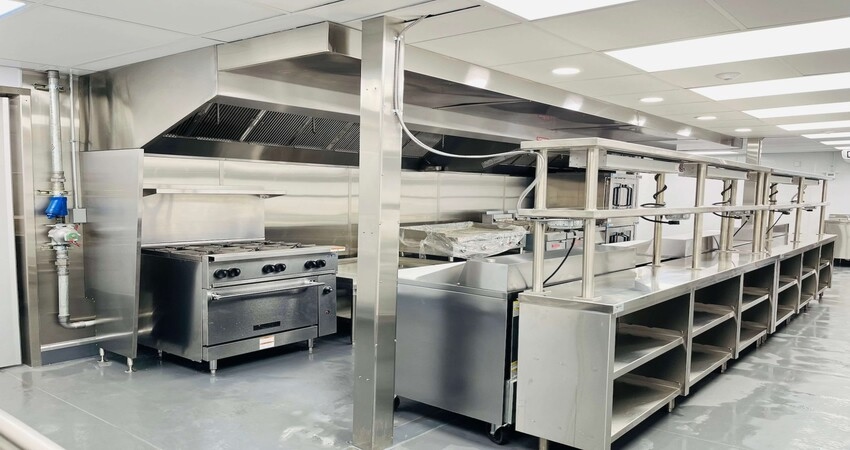
At ContekPro, we bring over 10 years of experience in designing and delivering premium prefab shipping container kitchens for the hospitality industry across the U.S. and Caribbean. Unlike basic container conversions, our units are purpose-built commercial kitchens — fully compliant, customizable, and delivered turnkey. For golf and country clubs, this means faster deployment, lower capital investment, and a kitchen that grows alongside member demand.
Every club has unique dining needs, from banquets and weddings to tournament concessions. ContekPro kitchens are designed around your workflows, with optimized layouts that support high-volume foodservice while maintaining efficiency and staff comfort.
Built in a controlled factory environment, our kitchens undergo rigorous quality assurance at every step. With good quality corten steel exteriors and NSF-certified stainless steel interiors, each unit is engineered for durability, hygiene, and long-term performance, even in high-demand hospitality settings.
Peace of mind starts with compliance. Every ContekPro unit is engineered to meet or exceed NSF, NFPA, ADA, and local health and building codes, ensuring your kitchen is inspection-ready from day one.
Our kitchens arrive fully equipped with commercial-grade appliances, integrated plumbing, electrical systems, fire suppression, and ventilation. Once delivered, they connect seamlessly to utilities — allowing clubs to launch new kitchens in weeks, not months, with minimal disruption to members.
As your club evolves, so can your kitchen. You can add units for prep, service, or cold storage. You can also relocate them across your property for tournaments or outdoor events or expand capacity over time without major capital projects. ContekPro kitchens provide long-term flexibility and future-proof investment value.
From concept to delivery and beyond, our team partners with you at every stage from design and permitting to logistics and post-installation support. Whether it’s your first container kitchen or your fifth, we make the process seamless, predictable, and stress-free.
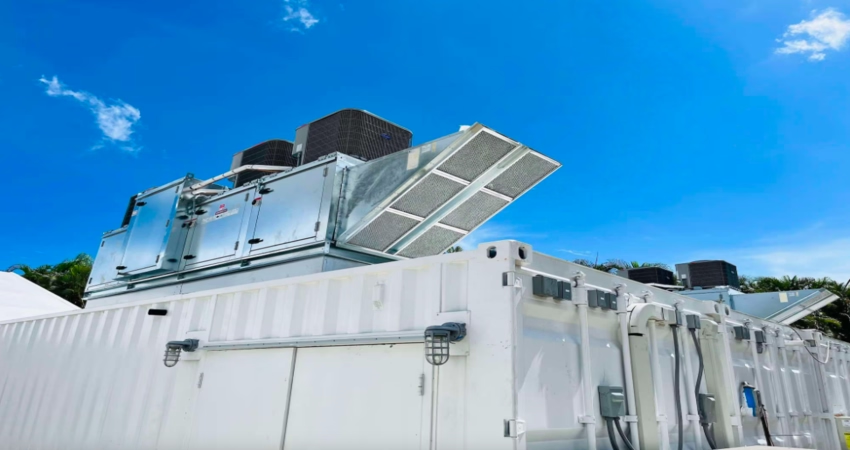
Golf and country clubs face growing expectations to deliver exceptional dining whether for daily member meals, weddings, or high-profile tournaments. Meeting this demand requires solutions that are fast, cost-effective, and scalable without compromising on quality. A shipping container kitchen provides exactly that: the flexibility to expand capacity, the speed to deploy in weeks, and the durability to meet the same standards as a permanent commercial build.
By partnering with ContekPro, clubs gain access to more than a decade of expertise in delivering turnkey, fully compliant, and customizable prefab kitchens. Our modular solutions help properties adapt to seasonal swings, maintain continuity during renovations, and elevate the member dining experience year-round.
Ready to reimagine your food and beverage operations? Explore ContekPro’s Hotel Kitchen and Fast Food Kitchen models or contact our team to design a bespoke container kitchen tailored to your club’s needs.
Golf and country clubs are turning to shipping container kitchens because they provide cost savings, faster installation, and seasonal flexibility without sacrificing quality. They allow clubs to host tournaments, weddings, and large events while maintaining smooth daily member dining.
Yes. Purpose-built container kitchens are engineered to meet or exceed NSF, NFPA, ADA, FDA, and local health and fire safety standards. This ensures they are inspection-ready and operate at the same level as a permanent commercial kitchen.
Absolutely! Units can be configured as full-service kitchens, prep stations, concessions, or specialty bars depending on the club’s needs. They can also be expanded or reconfigured over time, offering unmatched flexibility for seasonal or event-driven operations.